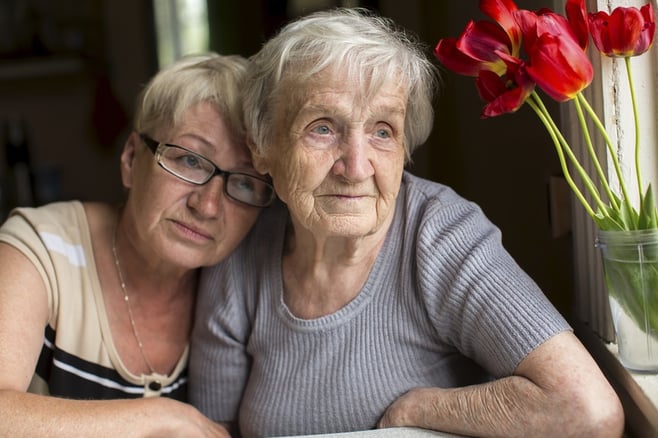
A new diagnosis of dementia or Alzheimer’s is often as hard for families to accept and process as it is for the seniors with those diseases.
Seeing the progression of memory loss in an older loved one is disconcerting — even frightening — especially if it proceeds quickly, as it often does in severe Alzheimer’s cases. Residential memory care can sometimes help to slow it; other times, it’s not as effective.
How can Louisville’s family caregivers cope when their older loved ones begin exhibiting profound memory loss? Are there tips for coping with memory loss that they could follow?
There are. Here’s what our memory care experts at Episcopal Church Home (ECH) recommend:
1. Don’t Try to Reason with Your Parent
An older parent with dementia will often exhibit behavioral changes. Like a young child, the person with dementia may have emotional outbursts — particularly late in the day, when he or she is tired (this is called “sundowning”) — and may become completely unreasonable or irrational.
Reasoning or arguing won’t help you or your older parent. It will only place more stress on you both. If older relatives become irrational, try to soothe them. Help them to relax.
Don’t try to appeal to your parent’s sense of “being an adult.” Dementia robs people of their restraint. Instead, use straightforward, simple sentences and an even, subdued tone.
Often, seniors with dementia act out because they’re frustrated; the best way to un-frustrate them is to remain calm yourself.
2. Use “Little Fibs”
Seniors with advanced dementia might become very upset when they realize something isn’t the way they remember it. If your mother asks when her long-dead sister is going to come over for a visit, for example, saying something to the effect of, “your sister passed away, don’t you remember?” isn’t going to help at all.
It’s going to upset your mother because she’ll suddenly realize not only that she doesn’t remember (disconcerting in and of itself) but that her sister is deceased.
It might seem awful or odd to lie, but think about it this way: do you tell your small children the whole truth about everything? Or do you fib, reassure and distract them?
An older adult with advanced dementia has a mind that is very much childlike; it has lost the ability to focus on anything other than its immediate surroundings and present needs.
So, if your mother asks when her sister is going to come visit, it’s perfectly ok to say that she’s not coming over today, but you know that she’s thinking about your mom. And it’s OK to change the subject.
3. Accept that You Can’t Be the Perfect Caregiver
It’s impossible. You’re going to occasionally make mistakes. You’ll think that your parent is incapable of doing something, and he or she will surprise you. You’ll think that he or she can handle a late evening holiday gathering at your home, and you’ll be wrong.
It’s OK. You’re going to feel exhausted. You’re going to feel stressed. You’re going to sometimes wish that your older loved one would just accept a move into residential memory care. You might even find yourself hoping that the ordeal will be over soon.
These are disturbing feelings to many caregivers. And a lot of people beat themselves up for having such thoughts, or for complaining when their loved one is suffering. But you’re human. These are completely normal feelings.
Momentarily thinking about the relief you’ll feel when the caregiving relationship is over doesn’t mean that you’re ungrateful or that you resent your parent. It means you need more support — or a respite care break to recharge your energy.
We’re here to support you.
Here at Episcopal Church Home, we host regular support group meetings, and they’re open to any family caregiver in the Louisville area who needs advice, a sounding board, and a safe place to vent.
We offer temporary memory care stays for seniors with dementia so that you can take a vacation or an extended break for self-care.
And, if caring for your older loved one at home is becoming too difficult for you to manage on your own, we offer person-centered, dignified, residential memory care that will enrich your loved one’s remaining time, and allow you both to focus on enjoying the time you have together.
Click here to learn more about all the ways the senior care and memory care experts at ECH can help you and your family.












